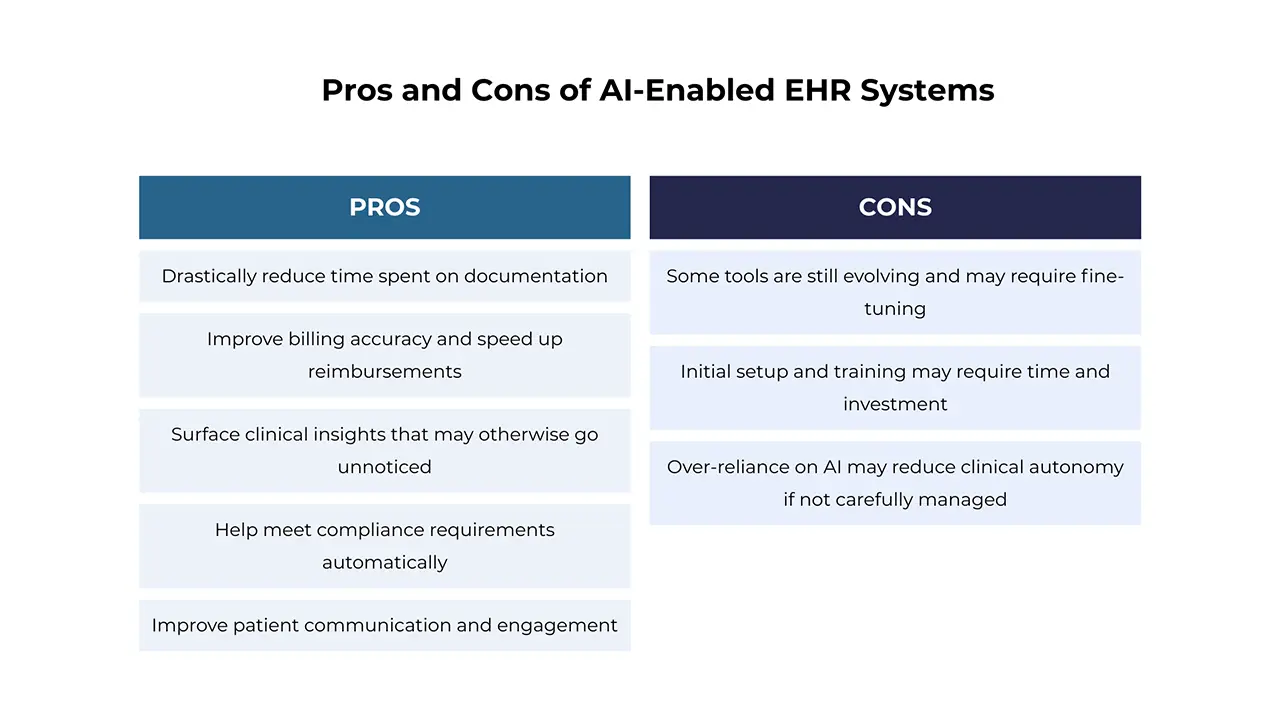Key Takeaways
- The best OBGYN EHR for practices should go beyond basic charting.
- In obstetrics and gynecology settings, EHR-integrated AI is now being used for documentation, predictive risk analysis, and automated billing and coding.
- The right AI-enabled OBGYN EHR system can improve care quality, reduce manual work, and keep you ahead of compliance challenges.
- Discover how the right patient management system improved scheduling, prescription management, and care coordination.
Artificial Intelligence (AI) is reshaping the future of women’s healthcare, offering OB-GYN practices smarter, more secure ways to manage everything from patient records to diagnostic workflows. Whether you’re a solo practitioner, part of a group, or managing a high-volume clinic, the right AI-enabled OBGYN EHR system can improve care quality, reduce manual work, and keep you ahead of compliance challenges.
But with every vendor claiming to offer “smart” tools, how do you know which systems are truly built to support OB-GYN care—and which are just marketing hype?
In this article, we’ll answer key questions about the best EHR systems for obstetrics and gynecology, how AI in obgyn EHR systems is being used, and what safety and functionality you should expect when adopting these technologies.
Table of Contents
What Is the Best EHR System for OB-GYN Practices?
The best OBGYN EHR for practices should go beyond basic charting. It should support specialty-specific workflows like prenatal visits, ultrasound tracking, cervical screenings, and MIPS documentation, all while making life easier for both clinicians and patients.
Key features to look for:
- OB-GYN-specific templates: Customizable workflows for obstetrics, gynecology, infertility, and menopause care.
- Integrated patient portals: For secure messaging, appointment reminders, and educational content.
- Prenatal tracking: Timeline views, fetal heart rate documentation, and lab integration.
- Ultrasound and imaging support: Ability to upload and annotate scans.
- MIPS-ready tools: Automated quality tracking and real-time alerts.
A truly modern EHR for obstetrics and gynecology will also integrate AI functionality to streamline administrative tasks and clinical decisions. That includes things like ambient documentation, predictive analytics, and real-time compliance checks.
How Is AI Being Used in OBGYN EHR?
AI in EHR systems is moving beyond automation. It’s now being used to make clinical care more precise, more personalized, and more efficient. In obstetrics and gynecology settings, EHR-integrated AI helps in several key areas:
- Clinical Documentation – AI scribes transcribe physician-patient conversations into structured notes using ambient listening and NLP (natural language processing).
- Predictive Risk Analysis – AI algorithms can identify trends or flag potential complications based on patient history. This is especially helpful for high-risk pregnancies or patients with multiple comorbidities.
- Automated Billing & Coding – AI coding assistants recommend the most appropriate codes based on your documentation while real-time alerts help ensure compliance and reduce claim denials.
- Streamlined Workflow – AI task routing helps front office staff by prioritizing follow-ups, labs, and diagnostics. Moreover, intelligent scheduling tools match patient needs with provider availability.
- Patient Communication – Chat agents answer routine questions and send personalized reminders. AI can also analyze patient engagement and even help identify early signs of postpartum depression or anxiety.
Is AI in OBGYN Healthcare Safe for Patient Data?
Yes. When implemented correctly, AI-powered EHRs in obstetrics and gynecology are designed with sensitive patient data security as a top priority. Given the highly personal nature of reproductive health records covering pregnancy history, fertility data, genetic testing results, and gynecological procedures, security and privacy safeguards are essential.
- HIPAA compliant and aligned with women’s health privacy regulations
- Use encrypted cloud storage to protect sensitive reproductive health information
- Offer role-based access control so only authorized clinicians can view pregnancy, fertility, or gynecologic records
- Provide audit logs and alerts to flag suspicious access attempts to confidential health details
Still, it’s important to ask your vendor detailed questions about how AI tools are trained, whether they store or share data externally, and what measures are in place to prevent misuse.
Pro Tip: Choose EHR systems that are transparent about their AI algorithms and allow OBGYN clinicians to review, edit, or override AI-generated recommendations particularly for prenatal care, fertility treatments, or surgical planning.
Pros and Cons of AI-Enabled EHR Systems

The key is choosing a system that allows for human oversight and clinician control. AI should support your decisions—not replace them.
Choosing an EHR That Grows With You
Whether you’re switching platforms or adopting an EHR for obstetrics and gynecology for the first time, choosing a solution with real AI capabilities is one of the smartest investments you can make for your OB-GYN practice.
- Offers OB-GYN-specific functionality
- Is transparent about how AI works
- Supports staff training and long-term growth
With the right system, you can deliver safer, more personalized care and free your team to focus on what matters most: supporting women’s health at every stage of life.










